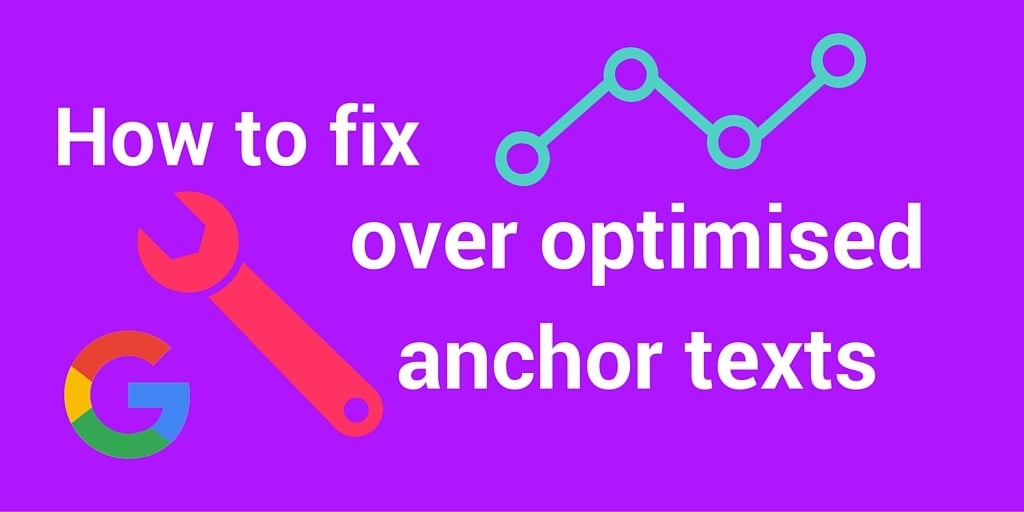Anchor texts play an important role in SEO and they can help improve your search engine rankings....
When you're working on increasing your domain authority (DA), it can be frustrating when you notice a massive and sudden decline. Seeing a small dip of 1-5 points isn't usually a big deal (updates can make your authority fluctuate).
However, if you see a big change, it's normal to feel a bit worried - you can check this by using Moz’s Domain Authority metric. There are certain actions that can hugely damage your domain authority. Are you guilty of damaging your DA?
Here are the nine things that will damage your domain authority and how you can avoid them.
- Suspicious link building
- High quantities of rich anchor text
- Lack of activity
- Massive keyword stuffing
- Slow… load… speed…
- Out of date SEO
- Too many spammy backlinks
- You haven’t optimised old content
- Lack of social posting
1. Suspicious link building
Buying links and other suspicious forms of link building can be damaging to your DA. Google has said before that being involved in link schemes will negatively impact your site's ranking, writing:
Any links intended to manipulate PageRank or a site's ranking in Google search results may be considered part of a link scheme and a violation of Google's Webmaster Guidelines. This includes any behavior that manipulates links to your site or outgoing links from your site.
This means:
- You shouldn't buy or sell links (you can't give free products in exchange for a link either)
- You can't do excessive link exchanges
- You can't use automated services that create links to your site
This type of link building activity will damage your domain authority and severely knock your keyword rankings too.
You need to actively avoid being involved in any link schemes. Seriously. Don't buy links otherwise Google will hit your site with penalties.
2. High quantities of rich anchor text
Using rich keyword anchor texts can greatly damage your rankings and DA. Your anchor text helps search engines understand what your site is about.
If your backlink profile is filled with high quantities of the same keyword anchor texts, search engines like Google will presume you're intentionally trying to boost your rankings for that keyword.
Google doesn't like that. It prefers variety.
Avoid using the same keyword anchor texts all the time and dilute your anchor texts with other relevant text.
3. Lack of activity
Lack of activity behind the scenes of your site can be detrimental to your DA. When I say this, I mean you haven't updated your site in a long time. There have been no blog posts in months. In fact, you have no recent content at all.
Google has previously said it'll give higher rankings to sites that have ‘the most relevant, useful results’. If the last time you wrote anything about your industry was in 2012, your site is going to be considered dated. In most cases, out-of-date information isn't helpful.
To fix this issue, regularly write and post fresh content to your website. This is why blogs are so helpful. Writing regular posts encourages search engines to crawl your site more often and shows you have brand new and up-to-date information.
4. Massive keyword stuffing
Just like overusing the same keyword anchor texts, stuffing your site with the same keywords will have a negative effect on your DA. This is known as ‘keyword stuffing’. You should avoid doing this - it's a basic SEO rule.
When writing page content and blog posts, you need to stick to using your keyword two to five times. Google can tell what your site is about just by crawling through it, so you don't need to stuff as many keywords as you can in a post.
5. Slow...load....speed
Your site speed is another ranking factor and it can affect your domain authority too. (If you’re interested in what ranking factors to chase, check out our blog on the subject!)
Sites with many high-quality images, adverts, links and features that slow their load speeds will likely lose higher rankings. People don't like slow websites and neither does Google.
But don’t fear, there are ways you can avoid damaging the speed of your site.
For example, compress your images and any running files in the background. Don't overstuff your web pages with too many images and videos. Adverts can decrease your site speed too so avoid having lots of ads (too many adverts will make your site look spammy anyway).
6. All technical SEO is NOT up-to-date
Search engines are always changing. Google, for example, regularly releases new updates to improve its usability. It's important to keep up-to-date with the latest search engine updates so your site isn't penalised.
You can improve your SEO by undertaking the following:
- Assess your keyword ranking
- Check your site speed
- Check your organic traffic rates
- Track your conversions
- Ensure your site is mobile-friendly
- Determine if Google is penalising you for anything - then fix it
- Diversify the distribution of your anchor texts
- Enhance lower-ranking keywords
- Optimise title tags
- Create data-driven content with internal linking
Doing SEO on your site isn't just one job. It needs tending to regularly to make sure everything is working properly. In fact, it’s a job that should never end. Your DA and rankings will suffer the consequences if your SEO isn't managed effectively.
7. Too many spammy backlinks
Spammy sites will regularly link to your site hoping to benefit their own rankings. This can be damaging to your DA. When Google penalises a site, it'll look at other sites the website is linked to.
For SEO and your DA, it's always better to keep your site as far away as possible from spammy sites. Check your link profile and clean them up.
8. You haven’t optimised old content
It’s not just about optimising things like title tags or image alt text - you also need to optimise old content itself. This means going back over year’s old content and:
- Updating broken links
- Including new data and replacing outdated facts
- Adding new content (long-form content is the best performing by far - we actually wrote a blog on it!)
- Update image alt text
- Add new internal links
- Use related keywords
You also need to make sure this content is regularly updated and published because there’s nothing worse than a person looking for data in 2021 and finding stats from 2014.
9. Lack of social posting
If you have a lot of relevant content, that’s great. But if you’re not posting it on social media, what’s the point? Social signals are big ranking factors and there’s nothing wrong with adding your content to the online conversation around certain topics - increasing the amount of organic traffic you’ll potentially get.
You can promote your content on any social media pages and encourage your followers to interact with that content - through likes, comments and shares. Similarly, you can include social sharing buttons on your content itself - such as ‘click to tweet’ buttons.
So those are the nine practices to avoid to help improve your domain authority. This isn’t the only learning you can experience today. If you’re ready to learn more about the best practices concerning digital marketing and inbound, join our Inbound After Hours group on Keyy for new things to learn, insights and opportunities for collaboration.
Click the link below to explore more.



